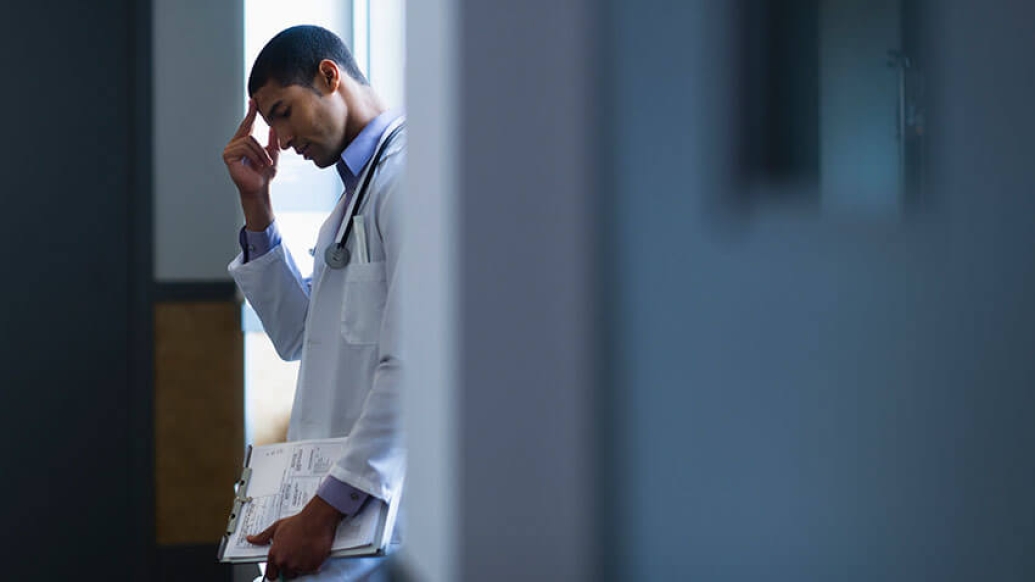Long-term study shows recent first-year residents had smaller jump in depression symptoms, possibly due to more sleep, fewer work hours and more mental health care.
5:00 AM
Author |

A 13-year effort to track the mental health of new doctors in their most stressful time of training shows signs that things have gotten better.
But those first-year residents, also called interns, still have a sizable risk of developing depression. And many who do still don't seek help.
The jump in depression scores over the course of the first post-medical school year has gotten 25% smaller from 2007 to 2019, according to the study of nearly 17,000 new doctors led by a team from the University of Michigan Medical School and published in the Annals of Internal Medicine.
To help understand potential drivers of the effect, the team explored individual and residency program factors previously shown to be linked to depression among training doctors. The study suggests, but can't prove, that reduced work hours, slightly increased sleep, more feedback from supervisors and increased use of mental health care contributed to the change in depressive symptoms over time. Data from the participants showed significant changes in all of these measures.
SEE ALSO: Who Gets Depressed Under Intense Stress? Genetic Risk Prediction Shows Promise
The findings come from the Intern Health Study, which has used wearable activity trackers, mobile apps, surveys and genetic tests to study medical interns at hundreds of teaching hospitals.
In addition to tracking a group with a known high risk of depression, the study provides a way to study the effects of intense, prolonged stress more generally.
That's why the new results could have impact beyond medical training. Other stressful jobs and long-term stressful situations might also benefit from the increased attention to reducing depression-related stressors that the graduate medical education community has focused on in recent years.
"The Intern Health Study offers a unique dataset for us to study the trend of this population's mental health over a long time span," said Yu Fang, M.S.E., the study's first author and a researcher at the Michigan Neuroscience Institute. "The story we have learned from these data could help to make strategic plans in shaping a better medical internship experience in the future."
SEE ALSO: Irregular Sleep Connected to Bad Moods and Depression, Study Shows
Srijan Sen, M.D., Ph.D., the leader of the Intern Health Study, added, "Given that depression rates are still very high, compared to the general population, we are hopeful that the drivers of improvement over the past 13 years can help guide areas to focus on to catalyze even more improvement going forward."
The reduction in the size of depression-score jump came despite the fact that interns in later years were more likely to have risk factors for depression, including a history of the condition.
The story we have learned from these data could help to make strategic plans in shaping a better medical internship experience in the future.Yu Fang, M.S.E.
The data show that interns' work hours dropped by 11% over the 13-year period, sleep hours per day went up nearly 5%, and the percentage of residents with current depression who were getting professional help went from 14% to 38%.
Over the course of the 13 years studied, female interns experienced a more pronounced reduction in the magnitude of depression symptom increases across the intern year, and they were much more likely to seek mental health care. The percentage of interns who were female also increased over the 13-year study period.
The same was true for interns in non-surgical fields compared with those pursuing training in surgery or another surgery-based specialty; the reduction in work hours was larger in non-surgical interns.
The study did not show any measurable difference between those whose intern year included the first months of the COVID-19 pandemic and those who trained before. Other research from the Intern Health Study is looking at the impacts of the pandemic, including one already-published study about interns taking part in the study in China.
The Intern Health Study is funded by the National Institute of Mental Health (MH101459). In adding to Fang and Sen, the study's authors are Amy S.B. Bohnert, Ph.D., M.H.S.; Karina Pereira-Lima, PhD; Jennifer Cleary, MS; Elena Frank, Ph.D.; Zhuo Zhao, MS; and Walter Dempsey, Ph.D. Sen and Bohnert are members of the U-M Institute for Healthcare Policy and Innovation.
Paper cited: "Trends in Depressive Symptoms and Associated Factors during Residency: 2007-2019," Annals of Internal Medicine. DOI: 10.7326/M21-1594

Explore a variety of health care news & stories by visiting the Health Lab home page for more articles.

Department of Communication at Michigan Medicine
Want top health & research news weekly? Sign up for Health Lab’s newsletters today!





